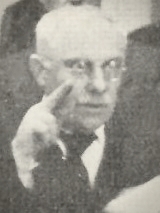Vladko Maček

Vladko Maček (born June 20, 1879 in Jastrebarsko , † May 15, 1964 in Washington, DC ) was a Yugoslav politician of the Croatian Peasant Party (HSS) . Through the Sporazum he was able to negotiate the establishment of the semi-autonomous Banschaft Croatia within the Kingdom of Yugoslavia in 1939 . In the Yugoslav government after the coup in March 1941 , he was Deputy Prime Minister for only four days .
politics
After the murder of Stjepan Radić in 1928, Maček succeeded him as chairman of the Croatian Peasant Party . He was a firm, if peaceful, opponent of the dictatorship of Alexander I of Yugoslavia . As a supporter of Croatia's independence, Maček was arrested several times and sentenced to prison terms. Among other things, he was imprisoned in 1933 in the notorious Glavnjača prison in Belgrade . After Alexander I's death in 1934, Maček was pardoned.

Through his skillful negotiations with Pavle Karadjordjevic , the place of the still underage King Peter II. Was Regent of the country, succeeded Maček on 26 August 1939, support of Britain and Italy in Sporazum broad autonomy for Croatia as Banovina Croatia ( Banovina Hrvatska ) within Yugoslavia to reach. His party then joined the central government of Yugoslavia, and Maček himself became Yugoslavia's deputy prime minister.
In the run-up to Nazi Germany's attack on Yugoslavia in the spring of 1941, the Germans offered Maček to found an independent Croatian state under his leadership after the country had been occupied by the German Wehrmacht. Maček turned down this offer and instead offered to act as a mediator to maintain peace between Yugoslavia and the Axis powers, which the German side refused. While the other representatives of his party in the Yugoslav government after the occupation of Yugoslavia by the Axis forces went into exile with them in London , Maček resigned from his position as deputy prime minister and returned to Zagreb .
After Maček's refusal, power in Croatia was transferred from the occupying powers to the Ustasha under Ante Pavelić , who proclaimed the Independent State of Croatia . Maček was placed under police surveillance and the Croatian Peasant Party, like all other political organizations with the exception of the Ustaše itself, was prohibited from further political activity. After significant parts of the party did not adhere to this ban and tried to spread the slogan that the Ustasha-ruled Independent State of Croatia was only a temporary phenomenon and after the war, with the support of Great Britain, the Croatian Peasants' Party again took power in a democratic Croatia Maček was temporarily detained, and even after his release he remained under house arrest and all contact with his party was cut off.

Maček continued to hope that after the war, with the support of the Western powers, his party would be able to take over the government democratically. Maček refused to work with the Communist Party under Tito , who as the leader of the partisan movement was finally recognized by the Western powers as the new head of the Yugoslav government in 1944, because he regarded it as undemocratic. In response, the communists demanded that those members of the Croatian Peasant Party who had joined the partisans expressly distance themselves from Maček and the allegedly reactionary mačekovci (Maček supporters).
Immediately before the partisans marched into Zagreb in the spring of 1945, he left the country after having been told by representatives of the withdrawing Ustaša regime that “his security cannot be guaranteed”. He first went to Paris and tried to contact the governments of the Western powers through the local high command of the Western Allied Forces in Europe, in order to call on them to campaign for free elections in Yugoslavia, now ruled by Tito. After unsuccessful, he emigrated to the United States . Vladko Maček died in Washington in 1964 and was buried in the Mirogoj Cemetery in Zagreb.
Fonts
- Istina o krvavim dogadjajima u Senju dne 9th V. 1937. [The truth about the bloody events in Senj of 9th V. 1937 ] . Mercantiles, Zagreb 1937.
- In the Struggle for Freedom . New York 1957.
literature
- Holm Sundhaussen: Maček, Vladimir . In: Biographical Lexicon on the History of Southeast Europe . Vol. 3. Munich 1979, pp. 65-68
Web links
- Newspaper article about Vladko Maček in the 20th century press kit of the ZBW - Leibniz Information Center for Economics .
Individual evidence
- ↑ Jere Jareb: Pola stoljeća hrvatske politike: povodom Mačekove autobiografije . Buenos Aires 1960, p. 49 .
| personal data | |
|---|---|
| SURNAME | Maček, Vladko |
| BRIEF DESCRIPTION | Croatian politician |
| DATE OF BIRTH | June 20, 1879 |
| PLACE OF BIRTH | Jastrebarsko |
| DATE OF DEATH | May 15, 1964 |
| Place of death | Washington, DC |
